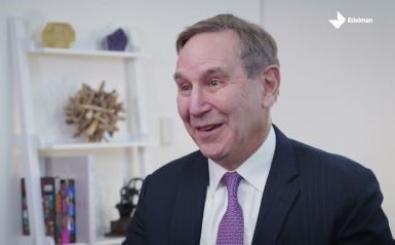The 2017 Edelman Trust Barometer reveals the largest-ever drop in trust across the institutions of government, business, media and NGOs. Trust in media (43 percent) fell precipitously and is at all-time lows in 17 countries, while trust levels in government (41 percent) dropped in 14 markets and is the least trusted institution in half of the 28 countries surveyed. The credibility of leaders also is in peril: CEO credibility dropped 12 points globally to an all-time low of 37 percent, plummeting in every country studied, while government leaders (29 percent) remain least credible.
The Trust Barometer found that 53 percent of respondents believe the current overall system has failed them—it is unfair and offers little hope for the future—while only 15 percent believe it is working, and approximately one-third are uncertain. Even the elites have a lack of faith in the system, with 48 percent of the top quartile in income, 49 percent of the college-educated and a majority of the well-informed (51 percent) saying the system has failed.
The gap between the trust held by the informed public and that of the mass population has widened to 15 points, with the biggest disparities in the U.S. (21points), U.K. (19 points) and France (18 points). The mass population in 20 countries distrusts their institutions, compared to only six for the informed public.
“The implications of the global trust crisis are deep and wide-ranging,” said Richard Edelman, president and CEO of Edelman. “It began with the Great Recession of 2008, but like the second and third waves of a tsunami, globalization and technological change have further weakened people’s trust in global institutions. The consequence is virulent populism and nationalism as the mass population has taken control away from the elites.”
Current populist movements are fueled by a lack of trust in the system and economic and societal fears, including corruption (40 percent), immigration (28 percent), globalization (27 percent), eroding social values (25 percent) and the pace of innovation (22 percent). Countries coupling a lack of faith in the system with deep fears, such as the U.S., U.K. and Italy have seen the election of Donald Trump, the Brexit vote and the failed Italian referendum.
The cycle of distrust is magnified by the emergence of a media echo chamber that reinforces personal beliefs while shutting out opposing points of view. Respondents favor search engines (59 percent) over human editors (41 percent) and are nearly four times more likely to ignore information that supports a position they do not believe in.
“People now view media as part of the elite,” said Edelman. “The result is a proclivity for self-referential media and reliance on peers. The lack of trust in media has also given rise to the fake news phenomenon and politicians speaking directly to the masses. Media outlets must take a more local and social approach.”
There is evidence of even further dispersion of authority. A person like yourself (60 percent) is now just as credible a source of information about a company as is a technical (60 percent) or academic (60 percent) expert, and far more credible than a CEO (37 percent) and government official (29 percent).
The 2017 Edelman Trust Barometer reveals the largest-ever drop in trust across the institutions of government, business, media and NGOs. Trust in media (43 percent) fell precipitously and is at all-time lows in 17 countries, while trust levels in government (41 percent) dropped in 14 markets and is the least trusted institution in half of the 28 countries surveyed. The credibility of leaders also is in peril: CEO credibility dropped 12 points globally to an all-time low of 37 percent, plummeting in every country studied, while government leaders (29 percent) remain least credible.
The Trust Barometer found that 53 percent of respondents believe the current overall system has failed them—it is unfair and offers little hope for the future—while only 15 percent believe it is working, and approximately one-third are uncertain. Even the elites have a lack of faith in the system, with 48 percent of the top quartile in income, 49 percent of the college-educated and a majority of the well-informed (51 percent) saying the system has failed.
The gap between the trust held by the informed public and that of the mass population has widened to 15 points, with the biggest disparities in the U.S. (21points), U.K. (19 points) and France (18 points). The mass population in 20 countries distrusts their institutions, compared to only six for the informed public.
“The implications of the global trust crisis are deep and wide-ranging,” said Richard Edelman, president and CEO of Edelman. “It began with the Great Recession of 2008, but like the second and third waves of a tsunami, globalization and technological change have further weakened people’s trust in global institutions. The consequence is virulent populism and nationalism as the mass population has taken control away from the elites.”
Current populist movements are fueled by a lack of trust in the system and economic and societal fears, including corruption (40 percent), immigration (28 percent), globalization (27 percent), eroding social values (25 percent) and the pace of innovation (22 percent). Countries coupling a lack of faith in the system with deep fears, such as the U.S., U.K. and Italy have seen the election of Donald Trump, the Brexit vote and the failed Italian referendum.
The cycle of distrust is magnified by the emergence of a media echo chamber that reinforces personal beliefs while shutting out opposing points of view. Respondents favor search engines (59 percent) over human editors (41 percent) and are nearly four times more likely to ignore information that supports a position they do not believe in.
“People now view media as part of the elite,” said Edelman. “The result is a proclivity for self-referential media and reliance on peers. The lack of trust in media has also given rise to the fake news phenomenon and politicians speaking directly to the masses. Media outlets must take a more local and social approach.”
There is evidence of even further dispersion of authority. A person like yourself (60 percent) is now just as credible a source of information about a company as is a technical (60 percent) or academic (60 percent) expert, and far more credible than a CEO (37 percent) and government official (29 percent).
Of the four institutions, business is viewed as the only one that can make a difference. Three out of four respondents agree a company can take actions to both increase profits and improve economic and social conditions in the community where it operates. Moreover, among those who are uncertain about whether the system is working for them, it is business (58 percent) that they trust most.
Yet business finds itself on the brink of distrust, and perhaps most concerning for business is the perceived role the public sees it playing in stoking their fears. A majority of the global population surveyed worries about losing their jobs due to the impacts of globalization (60 percent), lack of training or skills (60 percent), immigrants who work for less (58 percent), jobs moving to cheaper markets (55 percent) and automation (54 percent).
“After the challenges of 2016, 2017 has the potential to be a whole lot worse,” said Gurpreet Brar, General Manager for the Edelman Brussels office. “Across the continent we are seeing challenges materialise for the key pillars of society – politicians, business leaders, NGOS and the media – as the belief in the current system falters and a loss of trust in institutions becomes mainstream.”
“With this backdrop we have to ask ourselves, if we actually want to preserve these institutions, what we should do: the answers will be complex, but one simple conclusion is that a top-down solution will not do.”
Other key findings from the 2017 Edelman Trust Barometer include:
- Trust in business (52 percent) dropped in 18 countries, while NGOs (53 percent) saw drop-offs as high as 10 points across 21 countries.
- Employees, on average, are trusted 16 points more than CEOs on messaging around employee/customer relations (53 percent), financial earnings (38 percent), crises (37 percent), innovation (33 percent), industry issues (32 percent) or programs addressing societal issues (30 percent).
- Half of the countries surveyed have lost faith in the system, led by France (72 percent) and Italy (72 percent), Mexico (67 percent), South Africa (67 percent) and Spain (67 percent).
- Trust in traditional media fell 5 points to 57 percent, the steepest decline among platforms since 2012, followed by social media (41 percent), which dropped 3 points. By contrast, online-only media (51 percent) received the biggest bump in trust at 5 points.
Read the full report here: 2017-trust-barometer_eu-countries_april-2017



